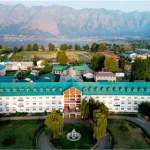BOOK REVIEW
Education is a multifaceted enterprise which involves a number of participants for its accomplishment. These participants which may be called the stakeholders thereof need to understand education as a societal process which springs from the very society which has to get benefits of this process. As such, education is a systematic process of enlightening and awakening “of the society, by the society and for the society!” Since basic definition of education is “the medication of behaviour,” of the educand or student, therefore, education as a holistic process should be able to modify all sections of the society and ennoble them for the activities or vocations or professions which they are going to take after getting “modified.”
Keeping in view the sublime task which education performs for the society as a whole, it could simply be termed as a “movement unto wisdom” because it makes the participants or stakeholders enough wise to shoulder the varied functions of the society. Now, since education has to disseminate wisdom to the society at large through the educands, therefore, education as a process should be well designed and well organized. That is to say that education should have its own wisdom which it should bank upon and depend on to make itself a lively phenomenon. Now, theoretically, psychology, sociology and philosophy are the disciplines which put forth the wisdom that is needed for education to make it serviceable for the society at large.
The book under review presents a vivid picture of these foundations of education required for structuring the curriculum but also managing the theoretical and practical dimensions of the educand as a subject of the endeavour called education. The book comprises of eight chapters excluding a brief “Preface” by the author who teaches Education at the Department of Education, North Campus of the University of Kashmir. Although the book has been designed for the guidance of the student community but keeping in mind its content, it could be of equal help to teachers as well as researchers.
In its Chapter I, the author has dealt with “Educational Philosophy” in general. The author is of the opinion that education plays the role of the mother for the human being because education not only helps the human being to survive and sustain her/his life but it also nurtures her/his rationality when it takes care of her/his social, cultural, spiritual, political and economic aspects. (p. 1) Declaring education as a tri-polar process, the author, on the authority of John Dewey, says: “The three poles (teacher, child, & society) should actively participate in the process of education, so that education system could be completed successfully.” (p. 7)
Chapter II of the book deals with “Idealism” as one of the foundations of education. The Idealists’ slogan, according to the author, is the “exaltation of human personality” on the eternal values of “Truth, Beauty and Goodness.” (p. 23) Describing these values on the authority of Plato, the author tries to put forth the three-dimensional model of the human personality. The author writes: “Truth is the intellectual value, beauty is the aesthetic value, and goodness is the moral value.” (p. 23) Quoting Ross, the author writes that “the function of education is to help us in our exploration of the ultimate universal values, so that the truth of universe may become our truth.” (p. 27)
“Naturalism” is the subject of Chapter III of the book. “Material world is [the] real world,” (p. 36) as per the Naturalists. That is why “naturalism is also known as materialism on the basis of the premise of [sic] that the universe is matter.” (p. 36) Defining different types of Naturalism, such as, Atomic Naturalism, Scientific Naturalism, Physical Naturalism, Biological Naturalism, Mechanical Naturalism and Historical Naturalism and describing J. J. Rousseau as the champion of naturalism (p. 37), the author quotes Rousseau’s exhortation vis-à-vis the freedom of child as: “Nature wills that children should be children before they are men. If we seek to pervert the order, we shall produce forward fruits without ripeness & flavor.” (p. 43)
Chapter IV of the book deals with “Pragmatism.” Taking the roots of Pragmatism to Protagoras, the sophist philosopher of ancient Greece, who had declared that “man is the measure of all things,” (p. 55) the author endeavours to explain the process of education through the words of John Dewey as: “Education is a process of continuous reconstruction of experiences” (p. 62) and “education is the social continuity of life.” (63) The pragmatists, as such, “suggest cooperative learning, & social discipline, & co-curricular activities which socialize the child.” (65)
The author has dealt with “Existentialism” in Chapter V of the book. It is believed that Existentialism, as a philosophy, was the outcome of the horrors and frustration caused by two world wars. Social crises and political upheavals set many a thinker, like Karl Jasper, Martin Heidegger, Gabriel Marcel, Jean Paul Sartre and Soren Kierkegaard to put forward a philosophy in which “existence precedes essence.” (p. 75) So, in education, Existentialism advocates developing unique qualities, developing brave and responsible human(s), making man aware of freedom and responsibility, creating death awareness, making better choices and enriching human mind. (pp. 81-2)
Chapter VI of the book deals with “Realism.” It is said that Realism came to fore as: i) a protest against the philosophy of Idealism and ii) as a development of science. Here, the author, quoting Butler, says: “Realism is the reinforcement of our common acceptance of this world as it appears to us.” (p. 89) Differentiating between Humanistic Realism, Social Realism, Sense Realism and Neo-Realism, the author here tries to elaborate the practical implications of Realism on education and curriculum formation where emphasis should be respectively on preparing the child for a real life and science subjects. (p. 91)
Chapter VII gives a detailed account of “Educational Thinkers.” The thinkers discussed by the author are Rabindranath Tagore, Swami Vivekananda, Mahatma Gandhi, Dr. Zakir Hussain, Dr. Sir Mohammad Iqbal, Jean Jacques Rousseau, Frobel, John Dewey and Maria Montessori. Being a detailed chapter, the author has tried to elaborate the educational thought as well as educational models of these thinkers. This, as such, forms one of the longest chapters of the book.
The author has finally given a vivid account of the “Indian Schools of Philosophy” in Chapter VIII. This chapter, as such, is well in tune with the general theme of the book. The book, by and large, would be beneficial for both students as well as scholars. There are, however, editing mistakes which have marred the quality of the book. If these editing errors are corrected and proper referencing is added to the book, it would indeed be a nice contribution to the corpus of knowledge in Education and Philosophy.
(The author is Assistant Professor at HED, J&K. Feedback: [email protected])





